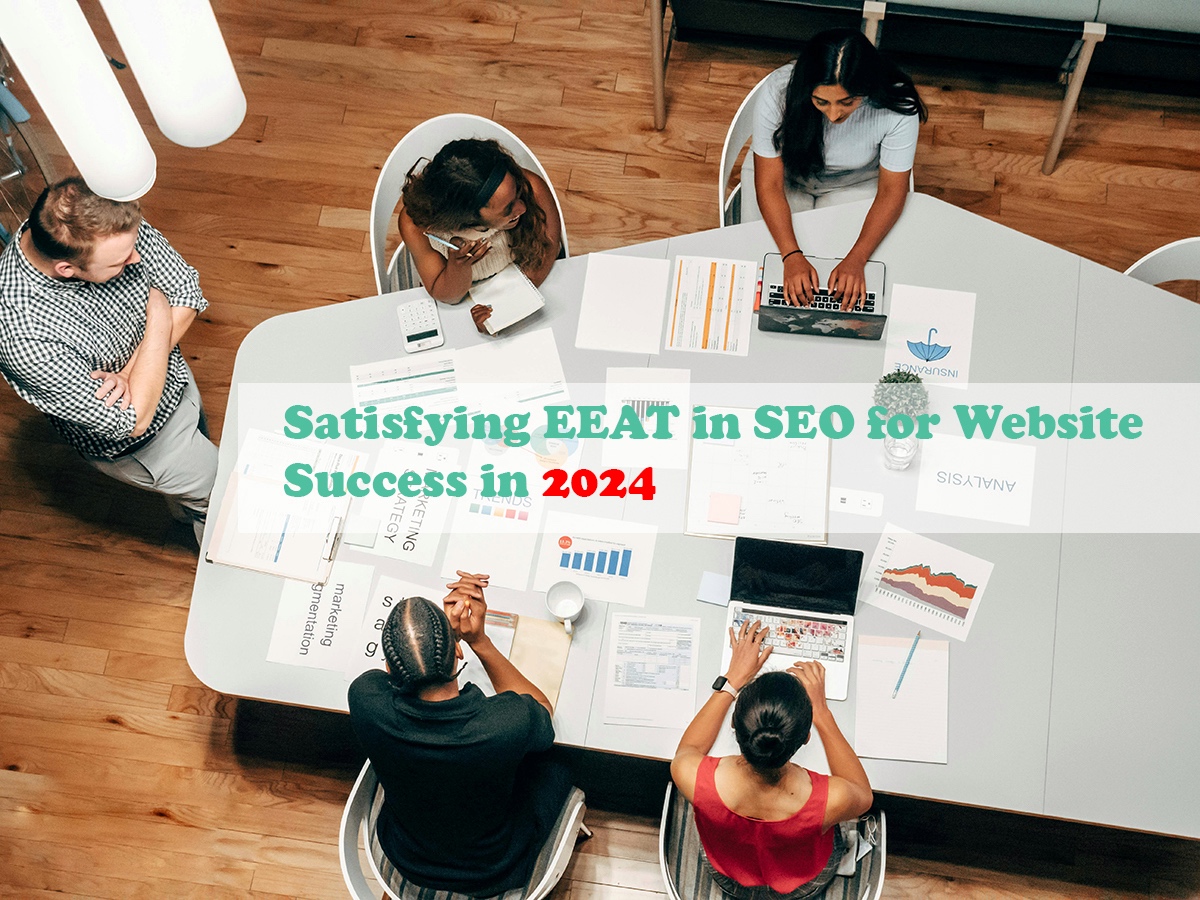Officially started in 2018 as E-A-T (expertise, authoritativeness, and trustworthiness) algorithm, Google’s EEAT in SEO (the first E stands for experience) is now playing a big role in ranking web pages and a website’s success.
Google has been focusing on EEAT a lot since 2022. So, as a website owner, SEO expert, or SEO content writer, you have to know what EEAT exactly means and how you can align your content with it to enhance your online presence and search results rankings.
In this article, we’ll break down the latest EEAT Google SEO guidelines in simple terms and provide some techniques and tips to help you optimize your content based on Google’s new updates in March 2024.
Team up with us and enjoy our free monthly SEO-optimized blogs for your website to attract more
leads. No up-front payments are required.
Call to talk to one of our digital
marketing experts at Top Organic
Leads.

Understanding Google EEAT in SEO
What does Google expect from your website content? The answer to this question has changed over time, and I can assure you it will change in the future as well. That’s why people in digital marketing and SEO business always have to look out for new updates.
Just a Very Short History of Google’s Search Quality Evaluator Guidelines (SQEG)
If you have been in this business for more than a decade, you can remember a simpler time when ranking your web page high in search results pages was mostly based on keyword optimization, backlink building, and on-page SEO optimization.
So, learning some technical tricks and using them properly for your website content was basically enough to get a good grade from Google and other search engines.
But around 2014 Google decided that content should be evaluated from the perspective of users. It should be able to answer users’ questions and provide credible information. This is especially necessary for content that has to do with users’ financial well-being, safety, and health according to YMYL (Your Money or Your Life) concept.
So, E-A-T was introduced several years ago as part of Google’s helpful content. It suggested that not only content creators should be experts in that field and provide trustworthy information but also the credibility and authority of the website must be proved in that subject.
To sum up, the focus of search quality evaluator guidelines used to be mostly on SEO technical matters and then shifted to credibility, content quality, and accuracy of information. But what about now?
Well, another E was added to the E-A-T search quality rater in December 2022 which stands for experience. Plus, AI-generated content became a big deal in 2023 and some other updates have happened since then. So, let’s make sure you’re updated.
What Does EEAT Content Mean in 2024?
Below, we’ll break down EEAT and explain experience, expertise, authoritativeness, and trustworthiness. We’ll also give you some tips and techniques for each factor to improve your content EEAT score (and your page ranking) in 2024.
-
Experience and Expertise: The Two Es in EEAT
The experience requirement emphasizes on real-life experience of the content creator and the website owner. This means that the information, advice, and comments are from a person who has real experience on the topic.
In addition, EEAT requires the author to be an expert in that field by having the necessary skills, knowledge, and understanding of the subject. This expertise can come from having related education and certificates or having been in that specific industry or market long enough.
These two factors make sure of the overall quality of the content and that it is helpful, reliable, and accurate.
-
Authoritativeness in EEAT
The content creators and the website should be reputable in their line of business and get recognition to prove their authority. This means that the author and website are verified as a reliable source of information.
This is assessed through backlinks, user reviews, and recommendations by other sources. An authoritative website is considered valuable by search engines and, therefore, ranks higher.
-
Trustworthiness; Last but Not Least Requirement of EEAT Google
The trustworthiness has to do with gaining the trust of the users by providing accurate, transparent, and reliable content for them. You can make your audience see the credibility of the content by having secure HTTPS, proper citations, and clear sources.
So, minimizing misinformation, protecting the user’s privacy, and ensuring data security will help to build trust.
Overall, to put EEAT search quality rater in a nutshell, the focus is on providing high-quality accurate people-first content by experienced experts and credible websites that can gain the trust of their audience. But how?
Tips and Techniques to Meet EEAT Requirements for Your Website Success
As you can get from the definition of each factor, both technical SEO and the information included in the content need to be reformed to align with Google’s EEAT guidelines. Here are some practical tips.
Add Authoritative Author and Editor Biographies
Each article should have a clear author biography to show his/her expertise and experience on the subject.
For sure, you prefer to follow an expert’s advice with related skills, knowledge, and degree rather than an unknown person or AI.
This is particularly true for businesses and topics that fall under the YMYL category. So, adding author and editor biographies is also important in establishing trust and indicating the website’s authority.
Make sure the author bio includes the following and that it is built in your site’s CMS’s backend.
- How many years have they been active in this industry?
- What are their areas of specialty and expertise?
- What related degree or certificate do they hold?
- Do they have any related professional accomplishments and/or awards?
- And, if they have any active social media accounts or a website, provide the links.

Of course, not all SEO writers are experts in the subject matter of the website. In that case, you should add the editor or reviewer schema. This is an actual expert with real-life experience. This shows that the content is still trustworthy and credible because it has been reviewed by an expert.
For example, one of our clients is an immigration lawyer in the US. Although our professional SEO writers produce the legal content, the lawyer reviews each one and adds suggestions and edits, if necessary, before the article is published.
So, having an expert in your editorial team is a must and it seems that it has become even more important for Google after the new updates rolled out in March 2024. A quick look at websites that lost traffic and those that gained more traffic after these updates shows that most winners have actual experts (with bios) writing their content.
Win Reputation and Trust by
- Requesting quotes with the help of HARO, Qwoted, and the like to connect with reputable websites in your industry.
- Add interviews with well-known experts or use trustworthy podcasts, articles, etc., as sources and references. Don’t forget to mention them (attribution).
- Provide links, both inbound and outbound, especially to other reputable website pages in your industry.
- Only write content that is related to your industry and line of work.
- Pay attention to the user experience and design of your site. Also, forget about annoying pop-ups, ads, mouse away, etc.
- Use social media to connect with your audience, get comments and reviews, and improve your business branding.
- Build high-quality backlinks from relevant sites.
- Make sure your GMB account is up-to-date and includes correct information.
- Add case studies, testimonials, clients’ reviews, and other user-generated content (UGC).
- Secure your site with an SSL certificate to have HTTPS encryption.
- Don’t forget to clearly state your privacy policy and have a transparent ‘About Us’ page.
More Tips about Producing Helpful Content
- Check the information you include in the content to make sure there are no factual errors or misinformation.
- Add a table of contents (with jump links) for each blog article to allow users to go straight to the sections they’re interested in.
- Write for the audience, not the search engines. It means having helpful people-first content is much more important than writing an article just to include certain keywords and links to be seen by search engines.
- Use AI-generated content only to get ideas. You need to make a lot of changes to AI content to make it unique. Keep in mind that any duplicate content, whether by human or AI, isn’t valuable.
- Don’t overoptimize the content by forcing keywords into the text and headings, too high keyword density, and keyword stuffing.
- Publish regularly but avoid having articles with similar subjects.
- Having topic clusters can help to improve your authoritativeness.
- Don’t just rely on text as content. Try to create videos (particularly short ones) with useful content.
- Keep updating your old website content and identifying new trends and gaps to write useful content.
FAQs about Helpful Content and EEAT in SEO
EEAT in SEO, and generally Google’s helpful content, could be too much for those who aren’t SEO professionals. Even for us, it can get confusing with lots of new algorithm updates Google has been introducing in the last couple of years (compared to the past, there have been many more of them!).
So, it’s not surprising to have a lot of questions about them. Let’s answer the most common ones.
Is EEAT Still Important in SEO and search engine result page rankings in 2024?
Yes. Actually, it seems that due to the rise in using AI-generated content since last year, which is basically a copy of already existing content, Google is trying to give more value to real-life experiences, unique content, and user-generated content and perspectives. So, there’s even more emphasis on EEAT in 2024.
Can I Use AI-Generated Content and Still Meet Google’s EEAT Requirements?
If you just copy-paste what you get from AI, as there’s no new and unique content in it, your article doesn’t satisfy EEAT requirements. Also, as the author is unknown, you can’t gain your users’ trust. Plus, Google doesn’t recognize your website as authoritative.
With All This Emphasis on Content, Is Technical SEO Still Relevant?
Of course, it is relevant. You still need to optimize your website speed, design, user experience, etc. These basic aspects of SEO will probably never become irrelevant because they’re somehow the nuts and bolts of digital marketing.
Let’s Sum Up Our Discussion of EEAT: What Should Be Our Priorities Now?
Well, as we have seen, Google is still focusing on its helpful content strategy, and by extension, EEAT guidelines. So, we should prioritize
- Adding proper writer and reviewer bios to content.
- Producing high-quality unique content that satisfies EEAT.
- Rewriting and updating old content.
- Learning how to leverage AI for both content generation and technical SEO.
- The users’ experience over satisfying search engines.
We should also keep up with Google’s new updates and try not to fall behind.
Follow the tips on EEAT in SEO as discussed above and make the necessary changes. Hopefully, you’ll start to see a good improvement within the next 2 to 3 months (read more about SEO Trends in 2024 here). Be patient!
And, if you need any professional help with digital marketing, our team of SEO professionals is here to level up your website with a pay-per-lead system. Call (971-248-0953) if you’re a business owner in the United States.


